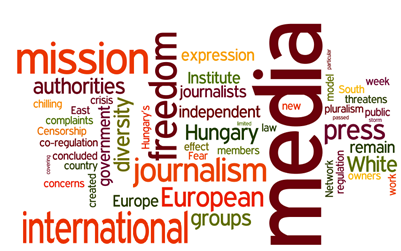 Published: 18 November 2011
Published: 18 November 2011
Region: EU

The Media Diversity Institute joined an international press freedom mission to Hungary, amidst renewed concerns about the threats to independent journalism in the country. The mission met with government and official representatives as well as lawyers, journalists, editors, and human rights groups and concluded with a statement warning that a mix of problems has created a profound crisis for journalism, diversity and pluralism.
“The confluence of a regulatory environment, deteriorating economic conditions, technological change and convergence in media, and a lack of unity and solidarity within the professional community has created a perfect storm that threatens the future of independent journalism in Hungary,” said the mission leader and MDI representative Aidan White.
The mission members – representing 12 regional and international press freedom groups – say that Hungary’s model of regulation is broad, uncertain and inconsistent with European standards of media freedom, and is creating a “chilling effect” for journalism in the country. They warn that attempts to export this model of regulation to other countries will undermine free expression.
In particular, the mission concluded that Hungary’s controversial media law passed earlier this year needs to be urgently reviewed because it threatens protection of sources for journalists; it allows limited possibilities for judicial review of the decisions of new regulators; and it introduces a media licensing regime that potentially undermines the promotion of diversity and pluralism which is an obligation under European and international treaties.
“A chilling effect is what happens when fear and uncertainty surrounds the work of media,” said White. “Fear of prosecution or victimisation leads to self-censorship and weakens watchdog journalism which is vital for democracy.”
The mission members learned that four associations of media owners covering the pressand online media have reached agreements on co-regulation with the authorities. They will take on the burden of dealing with complaints from readers and consumers. The authorities will pay them to do the work and will exempt their companies from stringent fines and penalties that could be imposed under the new law.
“This form of co-regulation is no substitute for self-regulation,” said White. “In Hungary it is effectively outsourcing censorship with the co-operation of national and international media owners alike.”
While questions remain over the capacity of the reorganized system of public service media to provide pluralist, diverse and quality information as a public good the mission says that the Government of Hungary should listen against to the concerns already expressed by the Council of Europe, the European Parliament, the OSCE, the UN Special Rapporteur on Freedom of Expression and international press freedom groups.
media to provide pluralist, diverse and quality information as a public good the mission says that the Government of Hungary should listen against to the concerns already expressed by the Council of Europe, the European Parliament, the OSCE, the UN Special Rapporteur on Freedom of Expression and international press freedom groups.
“These complaints remain valid and should be the subject of further dialogue with the authorities,” said White. “However the government and the authorities remain intransigent and this suggests that the media crisis will continue.”
The International Partnership Mission of freedom of expression and media development groups consisted of: Article 19, Freedom House, Index on Censorship, Independent Journalism Centre Moldova, International Press Institute, International Media Support, European Federation of Journalists, Media Diversity Institute, Open Society Media Programme, the Network for Reporting on Eastern Europe, South East Europe Media Organisation and South East European Network for Professionalisation of Media.